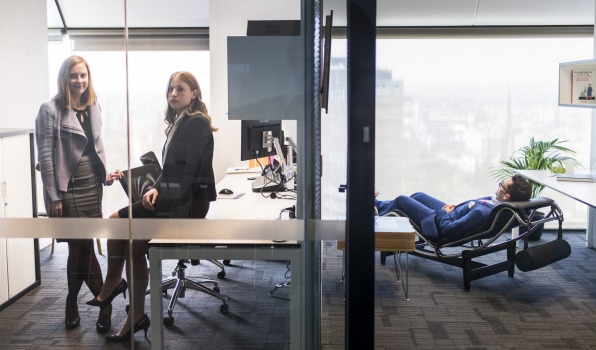As employee stress levels rise across the nation, employers are being forced to go beyond their traditional human resource programs offering yoga classes and meditation rooms.
Law firm Seyfarth Shaw has created a meditation room for staff, with partner Henry Skene saying the firm wanted a “genuine and tangible way” to support the health and wellbeing of our staff.
“We came across a lot of conventional wisdom about the benefits of mindfulness for professional services employees in particular, and its link with wellbeing and its link with performance. So for us we thought this would have very broad appeal,” he said.
Seyfarth Shaw employees range from 21-year-olds to those in their mid-50s but Mr Skene said there was no resistance from staff to the idea of a meditation room.
“It resonates with different people in slightly different ways,” he said. “Some people are drawn to the meditation components and for others it’s about recognising that what we do is a high-energy professional environment and making sure that you can take some time out, recharge and reflect and building that into your day.”
Packing a productivity punch
Mr Skene said he had underestimated the benefit of taking 15 minutes of reflective time during the course of his day.
Young lawyer Georgia Simmonds said in the course of her job there were competing demands and priorities.
“It’s really helpful to go in there and take time out to then return to your work with a new sense of clarity and a new sense of direction about how you are going to approach what you have on your plate,” she said.
“I don’t think we have a usual day – it can be long and unpredictable hours. In any high-rate environment each day is different, so it’s really helpful to have the space.”
Her colleague Brad McLean uses the room regularly, including at night when working long hours.
“I find that taking time out to focus on being present really reinvigorates me when I leave that room,” he said.
“I had not practiced it [mindfulness] before the room opened. I had heard of it but didn’t really understand what it meant or its benefits. I am a convert and I do try and do it at home.”
More leave to meditate
Lend Lease is also on the mediation bandwagon. In August, the property and infrastructure giant announced it would give staff an extra three days a year for “wellbeing leave”. This leave can be used for a range of activities, such as a yoga retreat, a meditation course, a preventative health check-up or carer’s respite.
It is on top of the usual leave entitlements and is aimed at improving productivity and reducing absenteeism.
In a recent report by The Resilience Institute, of 16,261 people across 250 companies between 2011-14, 81 per cent of staff experienced an intense work environment with 31 per cent experiencing very concerning levels of worry. Nearly a quarter of respondents (23 per cent) had chronic stress symptoms, and 36 per cent felt distressed and disengaged.
The Resilience Institute’s Stuart Taylor said when staff are stressed it’s a red flag as they are less productive.
He said although there was both an individual responsibility and a employer responsibility when it came to mental health, it was better to be proactive as a company as opposed to reactive.
“Levels like this are not sustainable at an individual level, let alone at a company level,” Mr Taylor said.
“If anything we are seeing that the intensity is continuing to increase. High performers especially suffer. But stress is a functional part of life, it’s not something that can be got rid of. Management and individuals need to understand where the stress comes from – is it pressure from the organisation or is it my reaction to that pressure?”
Removing stress sources
Workplace psychologist Laura Kirby, from CommuniCorp, said managers needed to understand the cause of the stress affecting their staff members and to minimise and remove it if possible.
“They also need to be equipped to pick up when people aren’t themselves and have a supportive conversation,” Ms Kirby said.
As one of Australia’s biggest employers, National Australia Bank people, communications and governance executive Michaelia Healey said mental health was more common and affected more staff than before.
“Anyone at any time might suffer,” she said.
“It’s not just about providing employee benefit schemes but understanding mental health is a social issue.”
Ms Healey said early intervention helped staff and employers need to provide not only counselling services but understand and allow staff to feel comfortable telling their leader.
From: AFR

